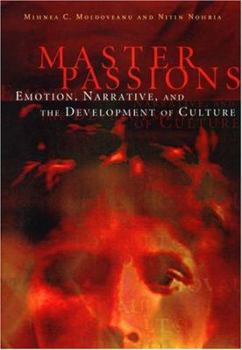Master Passions: Emotion, Narrative, and the Development of Culture
Select Format
Select Condition 
Book Overview
An exploration of the powerful role of anxiety, ambition, and envy in shaping both our individual lives and society as a whole. At the heart of the human experience lies anxiety caused by the realization that the world is unknown, forever eluding our control. And out of this anxiety arises the master passions of ambition and envy, which we repress to mask their power over our lives. Discussion of the role of the emotions in our lives is not new, but Mihnea Moldoveanu and Nitin Nohria go much further, showing how these passions shape not only our individual lives but our social and organizational culture as well. The master passions are not pretty, and so we cover them with the more socially acceptable faces of reason and morality. Moldoveanu and Nohria guide the reader in revealing the real impetus behind such actions as firing a friend, leaving a lover, or even pillaging your own people. Below the rational explanation, they show, often lies a willingness to hurt or even destroy others to fuel our own ambitions or quench the fires of envy. The authors offer intriguing thought experiments and examples from their own lives as they expose the power of the master passions. Deftly weaving ideas from psychology (Sigmund Freud), sociology (Max Weber), literature (William Shakespeare, Albert Camus), and philosophy (David Hume, Adam Smith, Karl Marx, Friedrich Nietzsche) with the personal, they build a strong argument that society would be much healthier if we faced the deception and self-deception that pervade our lives.
Format:Hardcover
Language:English
ISBN:0262134055
ISBN13:9780262134057
Release Date:January 2002
Publisher:MIT Press
Length:270 Pages
Weight:1.30 lbs.
Dimensions:0.9" x 6.4" x 9.2"
Age Range:18 years and up
Grade Range:Postsecondary and higher
Customer Reviews
1 rating
Ambitious, Philosophical, yet Riveting
Published by Thriftbooks.com User , 22 years ago
This is an ambitious and wide-ranging attempt at delving into the motivating underpinnings of human conduct, both for good and for ill. You get some flavor of the book, when you look in the index and find the names of Michel Foucault, Rene Girard, Mikhail Bakunin, Camus, Thomas Kuhn, Heidegger, Isaiah Berlin, Arthur Koestler, Sartre, Umberto Eco, Karl Marx, Milton Friedman, Samuel Beckett, Hegel, Descartes, Pascal, Nietzsche, Bergson, Dostoyevsky, Emil Cioran, Kafka, Lenin, John Milton, Max Weber, Simmel, Wittgenstein. With a strong philosophical orientation, the book was nevertheless shelved under "psychology" even though it was written by two graduate business school professors (Harvard, Toronto).Some of the chapter headings are intriguing: "Anxiety: the Primeval Broth", "Ambition as Desire and the Will to Power", "Envy and Jealousy: The Master Ratchets", "Want, Will, Wish, Would: the Predicaments of Desire", "A Self Against Itself: An Aesthetic or Rage", "Soliloquies of the Candid Villain: Catharses of the Master Passions".Personally, I found the book riveting. Once immersed in the discourse of the book, I could not put it down. The writing style reminds me of European writers like Catherine Clements or Slavoj Zizek though not Lacanian in the least, even if the subject matter circles around desire.I would highly recommend this book to anyone who is interested in books of this genre, mixing philosophy and the cultural sciences while ranging over a vast amount of territory in a short number of pages (to be exact, 231 pages without the references and index).It's actually a fun book to read, and if one does not take it too seriously, a lot of laughs. Or if one does take it seriously, then a survival manual and roadmap for achieving ultimate status and power, while ruthlessly overcoming one's rivals.





